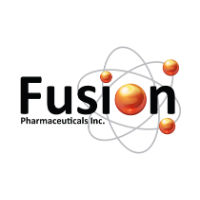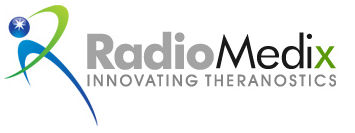预约演示
更新于:2026-02-27

Fusion Pharmaceuticals, Inc.
更新于:2026-02-27
概览
标签
肿瘤
泌尿生殖系统疾病
神经系统疾病
治疗用放射药物
抗体偶联核素
诊断用放射药物
疾病领域得分
一眼洞穿机构专注的疾病领域
暂无数据
技术平台
公司药物应用最多的技术
暂无数据
靶点
公司最常开发的靶点
暂无数据
| 排名前五的药物类型 | 数量 |
|---|---|
| 治疗用放射药物 | 11 |
| 抗体偶联核素 | 8 |
| 诊断用放射药物 | 3 |
| 小分子化药 | 1 |
| 多肽偶联核素 | 1 |
关联
16
项与 Fusion Pharmaceuticals, Inc. 相关的药物靶点 |
作用机制 PSMA调节剂 |
原研机构 |
在研适应症 |
非在研适应症- |
最高研发阶段临床2期 |
首次获批国家/地区- |
首次获批日期- |
靶点 |
作用机制 IGF-1R拮抗剂 |
在研适应症 |
非在研适应症- |
最高研发阶段临床1期 |
首次获批国家/地区- |
首次获批日期- |
靶点- |
作用机制- |
在研机构 |
在研适应症 |
非在研适应症- |
最高研发阶段临床1期 |
首次获批国家/地区- |
首次获批日期- |
10
项与 Fusion Pharmaceuticals, Inc. 相关的临床试验CTIS2025-521235-37-00
SPECT/CT imaging of FPI-2505 in patients with solid tumours; a phase 0 molecular imaging basket trial (SCOPE-study).
开始日期2025-07-15 |
申办/合作机构 |
NCT06909825
A Phase 2, Open-label, Multi-centre Study of FPI-2265 (225Ac-PSMA-I&T) and Olaparib in Participants With Metastatic Castration Resistant Prostate Cancer (mCRPC)
This study is an open-label, multicenter study designed to investigate the efficacy, safety and tolerability of FPI-2265 (225Ac-PSMA-I&T) in combination with Olaparib in participants with mCRPC. The dose optimization Phase 2 part will be investigating the safety, tolerability, and anti-tumor activity of novel dosing regimens of FPI-2265 and Olaparib in participants with metastatic castration-resistant prostate cancer.
开始日期2025-02-26 |
申办/合作机构 |
NCT06402331
A Phase 2, Randomized, Open-Label, Multicenter Study to Evaluate the Safety and Efficacy of FPI-2265 (225Ac-PSMA-I&T) in Patients With PSMA-Positive Metastatic Castration-Resistant Prostate Cancer (mCRPC)
This is an open-label, randomized, multicenter study of FPI-2265 (225Ac-PSMA-I&T). Patient population is adult participants with PSMA positive mCRPC who have had previous treatment with with 177Lu-PSMA-617 or another 177Lu-PSMA radioconjugate (RC). The purpose of the study is to determine the safety and tolerability, and recommended dose and regiment of FPI-2265.
开始日期2024-03-05 |
申办/合作机构 |
100 项与 Fusion Pharmaceuticals, Inc. 相关的临床结果
登录后查看更多信息
0 项与 Fusion Pharmaceuticals, Inc. 相关的专利(医药)
登录后查看更多信息
294
项与 Fusion Pharmaceuticals, Inc. 相关的新闻(医药)2026-02-22
·小白学药
点击关注小白学药
2026开年,放射性配体疗法迎来关键爆发节点。礼来、阿斯利康等巨头集体加码,锕-225供应成核心壁垒。临床前移+靶点破局,千亿市场谁主沉浮?
临床前移+靶点破局! 放射性配体疗法爆发前夜: 锕-225争夺战打响, 巨头抢滩, 资本押注千亿
2026 年开年,放射性药物领域就传来关键信号:乐天生物(LOTTE Biologics)正加码全球质量体系建设,其锡拉丘兹 ADC 生产中心加速 ramp-up,通过闭环系统、一次性技术、跨部门自检及实时监管监测等多重举措,筑牢质量防线,为全球 60 多个国家的产品供应保驾护航。
这一动作背后,是放射性配体疗法(Radioligand Therapy,RLT)行业规模化爆发的迫切需求 ——2025 年的行业变革已让 RLT 从 “小众治疗工具” 跃升为肿瘤领域的 “主流必备方案”,进入 2026 年,诺华、阿斯利康、礼来等巨头加速布局,资本聚焦产业链基建,核心同位素 actinium-225 的供应争夺战愈演愈烈,这一赛道正迎来关键爆发节点。
一、十年磨一剑:放射性配体疗法从 “niche” 到 “主流” 的跃迁
放射性配体疗法的核心逻辑是 “精准打击”:将靶向分子(配体、多肽或抗体)与放射性同位素结合,向肿瘤部位递送辐射,同时减少对健康组织的暴露。
多数疗法采用 “诊疗一体化(theranostic)” 模式 —— 先通过成像确认靶点摄取情况,再对合格患者进行治疗。
这一理念最早可追溯至 1940 年代放射性碘治疗甲状腺疾病,但肿瘤领域的突破始于神经内分泌肿瘤的肽受体放射性核素治疗(PRRT)。
2018 年,FDA 批准诺华的镥 - 177 标记生长抑素类似物(Lutathera),标志着 RLT 正式进入临床应用;随后前列腺特异性膜抗原(PSMA)靶向疗法的获批,进一步拓宽了其应用边界。
欢迎关注小白学药视频号
2025 年成为 RLT 行业的 “整合元年”,两大关键变化奠定其主流地位:治疗线前移
3 月,FDA 扩大诺华 Pluvicto 的适应症,允许其用于化疗前的 PSMA 阳性转移性去势抵抗性前列腺癌,为患者延迟紫杉醇类药物使用提供新选择。这意味着 RLT 不再局限于经多线治疗的患者,而是直接与标准疗法竞争,进入更早期治疗场景。适应症拓展
诺华在转移性激素敏感性前列腺癌(mHSPC)中开展的 PSMAddition 试验,显示出具有统计显著性和临床意义的影像学无进展生存期改善,有望将 RLT 纳入一线激素治疗方案。二、资本逻辑转变:从 “追分子” 到 “建基建”
如果说 2025 年证明了 RLT 的临床价值,那么资本的动作则预示着行业规模化发展的决心 —— 融资不再只聚焦单个候选药物,而是转向同位素供应、生产网络和平台能力的工业化建设。
2025 年多笔大额私募融资凸显这一趋势:
瑞士放射性药物开发商 Nuclidium 完成 7900 万瑞士法郎(约 9800 万美元)B 轮融资,用于推进铜基诊疗一体化项目,并在欧美扩展生产基础设施;
Actithera 超额认购完成 7550 万美元 A 轮融资,聚焦成纤维细胞活化蛋白(FAP)靶向 RLT,同时扩充发现平台;
ARTBIO 募集 1.32 亿美元 B 轮融资,推进 α 放射性配体管线,重点投入同位素供应和生产能力建设;
AdvanCell 完成 1.12 亿美元 C 轮融资,加速临床进程的同时,规模化其靶向 α 射线生产能力。
背后的核心原因在于 RLT 的独特供应链约束:同位素半衰期有限,需要严格协调的生产、快速配送和专业处理,无法像小分子药物或抗体那样批量储备。
这种 “物流依赖性” 成为行业规模化的关键瓶颈,而资本对基建的倾斜,正是行业走向成熟的标志。
2026 年初,这一热度延续至资本市场:Aktis Oncology 以每股 18 美元的价格超额完成 IPO,募资约 3.18 亿美元,礼来作为锚定投资者承诺出资约 1 亿美元。
这家公司聚焦 Nectin-4 靶向放射性偶联物,其招股书特别强调同位素供应协议(包括 actinium-225 的获取),印证了供应链在 RLT 领域的战略重要性。三、2026 焦点:actinium-225 供应战与三大关键看点
2026 年,RLT 行业的竞争将围绕 “核心同位素”“关键临床试验” 和 “靶点拓展” 三大维度展开,其中 actinium-225 的供应格局成为最关键的变量。1. actinium-225:α 射线领域的 “兵家必争”
相较于广泛应用的 β 射线同位素镥 - 177,α 射线同位素 actinium-225 能量更高、作用范围更小,被认为能对癌细胞造成更有效的双链 DNA 损伤,且对健康组织损伤更小,成为下一代 RLT 的核心方向。
但 actinium-225 的供应长期受制于传统生产方式:美国橡树岭国家实验室(ORNL)近 30 年来一直是主要供应商,通过 1940-50 年代核计划遗留的钍 - 229 衰变生产,但需求增长已远超其产能。
2024 年,百时美施贵宝(BMS)旗下 RayzeBio 就因 actinium-225 短缺暂停了一项 III 期试验。
为破解供应瓶颈,多方势力加速布局:技术迭代
NorthStar 采用电子加速器技术生产无载体添加的 actinium-225,声称实现商业化规模供应;BWXT Medical 在加拿大粒子加速器中心 TRIUMF 生产同类产品;Niowave 则采用超导电子直线加速器技术;巨头锁供
阿斯利康与 Niowave 签订 10 年供应协议,保障其收购 Fusion Pharmaceuticals 后获得的 actinium-225 靶向候选药物的原料;拜耳在 2022-2024 年间与 BWXT、Ionetix 等多家供应商签订协议;礼来通过投资 Ionetix 保障供应;替代路径
TerraPower Isotopes 与 Isotek 合作,从美国能源部(DOE)管理的铀 - 233 库存中回收钍 - 229,通过自然衰变获取 actinium-225。2. 2026 三大关键看点监管里程碑
ITM 公司的镥 - 177-edotreotide(ITM-11)用于胃肠胰神经内分泌肿瘤(NETs)的上市申请,FDA 已定于 2026 年 8 月 28 日做出决策,若获批将为该领域增添新的 PRRT 选择;临床数据更新
诺华 PSMAddition 试验的总生存期数据将在 2026 年进一步披露,有望明确 RLT 在前列腺癌一线治疗中的定位;BMS 的 RYZ101、Fusion 的 FPI-2265 等 α 射线 RLT 的后期临床试验,将披露耐受性、重复给药可行性等关键数据;靶点突破
行业正尝试突破 PSMA(前列腺癌)和生长抑素受体(神经内分泌肿瘤)两大传统优势靶点,探索 FAP、Nectin-4 等新靶点在更大规模试验中的表现,核心验证成像筛选可靠性、肿瘤摄取一致性和安全性。四、行业展望:基建与创新双轮驱动
放射性配体疗法的 2026 年,将是 “基建决胜创新” 的一年。从乐天生物加码全球质量管控,到巨头锁定同位素供应,再到资本涌入生产设施建设,产业链各环节都在为规模化爆发做准备。
随着更多疗法进入后期临床和早期治疗线,同位素供应、生产配送网络的可靠性将成为企业竞争的核心壁垒,预计将涌现更多基础设施和制造相关的合作与并购。
从长期来看,RLT 的潜力不仅在于肿瘤治疗的适应症拓展,更在于多同位素平台的构建 —— 除了镥 - 177 和 actinium-225,铜 - 67、砹 - 211、铅同位素等新兴同位素的研发也在推进。
正如 Eclipse Ventures 合伙人 Justin Butler 所言:“如果这个行业真的要达到我们预期的规模,我们需要具备处理所有这些同位素的能力。”
巨头入局、资本加码、供应链成熟,放射性配体疗法正从 “单点突破” 进入 “生态共建” 的新阶段。
2026 年的行业动态,将决定这一疗法能否真正成为肿瘤治疗的 “主流选项”,为患者带来更精准、更可及的治疗方案。
#放射性疗法 #放射性药物 #放射性配体疗法 #锕225
点击关注小白学药
喜欢就点个感恩一路相伴
推荐阅读小白学药祝大家:马年大吉!财源滚滚!国产ADC的2026, 凭什么成爆发元年? 恒瑞十连破、新诺威拓靶点、华东拿下 FDA 孤儿药, 国产创新改写全球肿瘤治疗格局!ADC爆发元年, 赢在CDMO联盟: 端到端加速研发, 降本又提速!致敬科技她力量! 2026全球生物技术领域7位影响力女性, 正在改写医药未来ADC | 双喜临门! 刘勇军携2.8亿融资创业, 周伟昌当选美国工程院院士全球ADC新浪潮来袭! 8 家Biotech领跑下一代创新, 2034 年市场将破 600亿美元创新药(五) | 千亿出海、首次盈利、30天审批:2025,中国创新药终于站上世界C位创新药(四) | 不止ADC! 核药、AI制药、New Co模式崛起, 从卖产品到定规则, 中国创新药 License-out 全球第二!创新药(三) | ADC出海, 双抗破冰, CGT普惠: 中国创新药商业化“最后一公里”打通了!2026 年全球生物制药领域核心会议指南:见证医学突破与行业风向医药人必藏双平台:「小白学药」公众号+视频号艾伯维双抗命悬一线, 但故事没完! ADC赛道再添狠角色! 乐天生物, 2026 新基地剑指全球GSK联手韩国公司, 改写PD-1给药规则; 2026 Biotech复苏藏三大隐忧!下一代抗体药物浪潮来袭:ADC、双抗领衔,研发、生产、商业化全解析艾伯维ADC落地韩国改写卵巢癌治疗; 弼领生物 2 亿 B 轮加码纳米偶联破解耐药+全球突围! 信达三抗获FDA快车道, 亚洲43%创新管线领跑世界
声明:本公众号所有推文不构成任何投资意见和建议,其中科普性质内容,非医疗建议。转载请注明出处:小白学药公众号。部分内容源于网络公开信息,仅用于交流学习传播知识,侵删。因水平有限,若出现错误,欢迎指出。
放射疗法抗体药物偶联物
2026-02-21
·汇佳生物
随着基于放射性同位素的癌症疗法不断推进,供应商正加大生产投入,以支撑与AstraZeneca, Bayer等制药企业的合作。
Ac-225作为放射性药物领域的下一个热门方向,正引发一场扩充与获取该同位素产能的竞赛。随着头部药企将候选药物推进至临床后期,Ac-225供应商纷纷增资扩产,并签署一系列合作协议,以满足客户对这一 α 核素的需求。
自 2018 年 FDA 批准Novartis的 Lutathera 以来,Lu-177这一 β 发射同位素便定义了快速增长的放射性药物行业。Novartis在 2022 年获 FDA 批准的放射性配体疗法 Pluvicto 同样使用该同位素。
2025 年,这两款癌症药物 Lutathera 与 Pluvicto 合计为Novartis实现28 亿美元销售额。
制药企业仍在持续投资基于Lu-177 的抗癌药物。Novartis正开展多项临床试验以巩固领先地位,ITM 于 11 月提交上市申请, Eli Lilly等企业也在推进相关产品临床。
与此同时,行业重心正逐步超出Lu-177,企业开始研究以Ac225为代表的更多同位素,以谋求竞争优势。如今,这一 α 核素的供应商正在加速扩产。
与Lu-177 相比,Ac-225在更小范围内释放更高能量。基于该核素的疗法疗效可能更优 —— 因其能在癌细胞中造成更多 DNA 双链断裂,且对健康组织损伤更小。
Novartis在 2019 年研发日就已提及布局 α 核素,尤其是Ac-225,但行业真正爆发是在数年之后。
2023 年 10 月至 2024 年 3 月,AstraZeneca、BMS、Eli Lilly均通过收购布局Ac-225候选药物的生物技术公司。
项目数量激增导致供应链紧张,2024 年 BMS 旗下 RayzeBio 曾因Ac-225短缺暂停一项 Ⅲ 期临床试验。
放射性药物研发热潮施压特殊供应链,行业能否从数十亿美元投资中获得回报,取决于受到严格监管、且对物流时效要求极高的供应链。
近 30 年来,橡树岭国家实验室(ORNL) 一直是Ac-225的主要供应商。这一由美国能源部(DOE)资助的研发中心,利用上世纪四五十年代核项目遗留的Th229衰变生产该同位素。ORNL 已增加发货量,但需求增速仍超过其扩产能力。
目前,多个机构正致力于提升供应。TerraPower Isotopes 与 Isotek 合作,从美国能源部管理的U-233 库存中回收Th-229,以此扩大天然衰变产生的Ac-225供给。
在美国能源部统筹下,ORNL 及另外两家国家实验室利用加速器束流设施从Th232 制备Ac-225。但该工艺产出的物料会被Ac-227 污染,因此行业正在开发回旋加速器、直线加速器等替代路线。
NorthStar 首席执行官 Frank Scholz 向 BioSpace 表示,产量、可靠性与可扩展性是公司选择电子加速器技术生产Ac-225的关键依据。
经测算,若采用回旋加速器,公司需购置 10–15 台(视型号而定)才能满足供应需求。
“这意味着巨额资本支出,还要使用多台可能故障、需维护的设备。”Scholz 称,“决策不仅限于我们重视的纯技术层面,最终是基于整体商业考量。”
NorthStar 生产的Ac-225不添加稳定元素,所得产品效价更高,即无载体添加同位素(non-carrier-added)。该公司近期宣布,成为全球首个使用电子加速器技术实现商业化规模n.c.a Ac-225生产的企业。
BWXT Medical 在加拿大粒子加速器中心 TRIUMF 生产n.c.a Ac-225。Niowave 使用超导电子直线加速器。Eckert & Ziegler 采用基于回旋加速器的方法。
产能投入直接反映行业对Ac-225的需求。2024 年 12 月,AstraZeneca 与 Niowave 签署 10 年供应协议,在原有合作基础上续约,为其 2024 年以 24 亿美元收购 Fusion Pharmaceuticals 获得的候选药物锁定Ac-225来源。Fusion 早在 2023 年就已与 BWXT Medical 合作获取该同位素。
Bayer近年签署多项Ac-225供应协议,2022–2024 年间先后从 BWXT、Ionetix、NorthStar、PanTera 采购。
Cellectar Biosciences 于 2024–2025 年与 NorthStar、ITM、Nusano、Ionetix 签约,实现供应链多元化。
Eli Lilly以 14 亿美元收购的 Point Biopharma 于 2021 年与 Ionetix 合作采购Ac-225,Eli Lilly则在 2024 年投资 Ionetix。
Ariceum Therapeutics 于 2025 年与 ITM 和加拿大核实验室合资公司签约获取Ac-225。
Eckert & Ziegler 也签署一系列协议,为 Actinium Pharmaceuticals、GlyTherix、SK Biopharmaceuticals 等提供Ac-225。
对其他同位素候选药物的投资表明,产能仍需持续升级。
Nucleus RadioPharma 首席执行官 Steve Hahn 向 BioSpace 表示,Cu-67、At-211 目前仍存在产量不足问题,这些同位素正进入日益多样化的研发管线。
Eclipse Ventures 合伙人 Justin Butler 向 BioSpace 预测,未来候选药物将不仅涉及镥、锕,还会包括铅、铜等同位素。他表示:“如果这个行业真要达到我们预期的规模,就必须具备处理所有这些核素的能力。”
往期回顾
Niowave 公司扩大与AstraZeneca的全球供应协议,为新一代癌症疗法提供Ac-225
QSA和Niowave建立合作,改善Ra的提纯、提高Ra的可用性和Ac-225的产量
Niowave计划在美国密歇根州兰辛地区投资2000万美元进行扩建
汇佳生物专注于转化医学领域的前沿研究及临床转化应用技术,业务涵盖生物标志物和药物靶标技术,新型诊断试剂及治疗药物的研发,相关仪器设备的开发及临床转化技术的应用,实现了产、医、研的融合发展。
媒体合作/科研宣传/产品咨询
长按二维码,联系我们
放射疗法并购临床3期
2026-02-18
·同写意
100+全球先锋领袖现场开讲、50+顶尖新基建机构抢先入驻、1000+产业精英面对面链接,中国ADC和核药产业界规格最高、影响力最大、汇聚创新力量最全的年度品牌盛会!
2026年伊始,放射性药物领域即以一场备受瞩目的IPO拉开序幕。
1月,Aktis Oncology完成扩大规模的首次公开募股,融资总额约3.18亿美元,发行价每股18美元,礼来公司作为锚定投资者承诺投入约1亿美元。
这是本年度首批规模可观的生物技术IPO之一,也彰显了资本市场对放射性药物领域的高度信心。
Aktis在IPO招股说明书中,特别强调了其同位素供应链布局,包括获取锕-225的稳定供应渠道。这一细节,再次印证了材料获取与生产能力在放射性药物研发战略中的核心地位。此外,Aktis与礼来保持战略合作,礼来有权将部分合作项目推进至后期开发与商业化阶段。
单一IPO事件尚不足以断言生物科技融资市场的全面回暖,但此次融资的规模与大型药企的深度参与,至少表明放射性药物领域仍在持续吸引优质资本的关注。
TONACEA
01
“进攻”前线
放射性配体疗法通过将小分子配体、多肽或抗体等靶向分子,与放射性同位素结合,实现对肿瘤部位的精准辐射递送,同时最大限度减少对正常组织的损伤。
该领域普遍采用诊疗一体化策略:首先通过影像学检查确认靶点摄取情况,随后仅对显像阳性的患者实施治疗。
早在20世纪40年代,放射性碘就已用于甲状腺疾病治疗,但在肿瘤学领域的重大突破发生在数十年后。
肽受体放射性核素疗法(PRRT)在神经内分泌肿瘤治疗中的应用,标志着该领域的重要进展。通过使用放射性标记的生长抑素类似物靶向表达生长抑素受体的肿瘤细胞,最终促成2018年镥-177 dotatate(Lutathera)在美国获批上市。
此后,前列腺癌治疗领域也迎来突破,针对前列腺特异性膜抗原(PSMA)的疗法相继问世,PSMA作为一种在前列腺肿瘤中高表达的蛋白,成为理想的治疗靶点。
到2025年,放射性配体疗法的版图很大程度得以整合巩固,最重大的结构性变化,并非验证放射性配体疗法的有效性,而是其治疗线序的显著前移。
Pluvicto适应症的扩展,标志着该疗法不再局限于末线治疗场景,正式进入更早期的治疗梯队。换言之,放射性配体疗法正逐步探索其主流肿瘤治疗手段的地位。
PSMAdition临床试验的结果进一步印证这一趋势。该研究探索了Pluvicto联合标准激素治疗在转移性激素敏感性前列腺癌(mHSPC)中的应用价值。
诺华公布的数据显示,在预设的中期分析中,联合治疗组在影像学无进展生存期方面取得具有统计学意义和临床价值的显著改善。若该适应症最终获批,放射性配体疗法将与一线激素治疗并驾齐驱,而非仅作为后续补救措施。
2025年的另一个重要信号,在于资本流向的转变。
投资者不再满足于追逐少数几个前景可期的候选药物,而是开始为更大规模的产业化布局铺路。当年完成的数起大规模私募融资,资金用途均明确指向同位素获取、生产网络建设和平台能力提升,而非仅仅用于推进单一临床项目。
• 瑞士放射性制药企业Nuclidium于7月完成7900万瑞士法郎(约9800万美元)B轮融资,旨在推进其铜基诊疗一体化项目的同时,扩建欧美地区的生产基础设施。
• 仅一日之隔,Actithera获得超额认购的7550万美元A轮融资,用于推进靶向成纤维细胞活化蛋白(FAP)的放射性配体项目及其发现平台建设。
• ARTBIO随后完成1.32亿美元B轮融资,明确将资金用于α放射性配体管线开发及同位素供应与生产能力建设。
• AdvanCell也在2025年初完成1.12亿美元C轮融资,同步推进临床项目与靶向α疗法生产能力的规模化建设。
TONACEA
02
巨头争锋
核药市场的特殊性,决定了这是一个高门槛的游戏。与传统药物不同,放射性药物研发需要跨越核物理、放射化学、肿瘤学和药物研发多个领域,且涉及严格的放射性物质管理规范。
根据Evaluate Pharma的数据,全球核药市场在2023年已达到约100亿美元规模,预计到2030年将增长至300亿美元。其中,用于癌症治疗的放射性药物占据最大份额,特别是前列腺癌、神经内分泌肿瘤和淋巴瘤等适应症领域。
诺华无疑是这场竞赛的领头羊,通过一系列精心策划的收购,构建了核药领域的完整版图。2017年,诺华以39亿美元收购Advanced Accelerator Applications,获得了Lutathera;2018年,又以21亿美元收购Endocyte,获得了后来成为重磅产品的Pluvicto。
这些投资正在产生丰厚回报。2025年,Pluvicto全年销售额达19.9亿美元,同比增长42%;Lutathera销售额为8.16亿美元。诺华预计,Pluvicto的销售峰值可能超过50亿美元,有望成为历史上最成功的核药产品。
诺华一边持续推进Pluvicto适应症拓展,继2025年3月扩至化疗前mCRPC人群后,近期mHSPC III期研究传来捷报;一边布局α核素领域,推进β核素与α核素协同治疗研发。近年来,诺华通过收购多家核药研发企业,丰富多癌种管线,将RLT技术拓展至肺癌、乳腺癌等高发实体瘤领域。
阿斯利康则选择了一条差异化的追赶路径。
2024年3月,阿斯利康宣布以约24亿美元的总交易价值收购Fusion Pharmaceuticals,一举获得了包括FPI-2265在内的多款在研核药。FPI-2265是一种针对PSMA的放射性偶联药物,采用了锕-225这一α核素,与诺华Pluvicto使用的β核素镥-177形成技术差异。
α核素与β核素的不同选择代表了核药研发的两条技术路线。α粒子质量更大,能量更高,能更有效地造成DNA双链断裂,但同时也面临更大的安全性挑战。阿斯利康押注α核素技术,试图在下一代核药技术上建立领先优势。
礼来的入局则更加激进。
通过收购Point Biopharma,礼来获得了PNT2002等候选药物,快速补齐PSMA靶向核药管线,同时兼顾多癌种、多技术路线探索。2025年2月,礼来与AdvanCell达成战略合作,整合其Pb212生产技术与核素开发设施,共同推动靶向α放射性核素疗法研发。
目前,礼来核药管线已覆盖RLT、α核素、RDC等多个领域,涉及多种癌种,快速从核药“新手”成长为有力竞争者。
除了上述巨头,拜耳凭借其已上市产品Xofigo(镭-223)也在核药市场占有一席之地。Xofigo主要用于去势抵抗性前列腺癌骨转移治疗,凭借显著疗效占据全球相关市场重要份额。
TONACEA
03
2026年,值得关注
01
监管审批节点
ITM公司的Lu-edotreotide-177(ITM-11)用于胃肠胰神经内分泌肿瘤(NETs)的审评进程值得关注,FDA已设定目标审批日期为2026年8月28日。
若顺利获批,该产品将打破镥-177 dotatate(Lutathera)自2018年以来在该领域的独占格局,为神经内分泌肿瘤患者提供更多PRRT治疗选择。
02
数据更新
继Pluvicto适应症前移之后,业界目光转向更早期治疗数据的成熟度。
诺华在PSMAdition研究中公布的影像学无进展生存期获益引发广泛关注,但总生存期数据尚不成熟。2026年若有进一步数据披露,将有助于明确该疗法在转移性激素敏感性前列腺癌一线治疗策略中的定位及其获益持久性。
03
α核素疗法的临床验证
大型药企的战略布局已明确指向α核素疗法领域,BMS收购RayzeBio、阿斯利康收购Fusion均彰显了其对这一技术路线的高度认可。RayzeBio的RYZ101与Fusion的FPI-2265,都已进入后期临床开发阶段。
2026年的关键看点不仅在于早期应答率的提升,更在于耐受性数据的积累、重复给药的可行性验证以及α核素规模化供应能力的实际落地。上述证据的完善将为α核素疗法的广泛临床应用奠定基础。
— 写在最后 —
放射性配体疗法能否突破PSMA与生长抑素受体这两大成熟靶点的局限,是衡量该领域发展潜力的重要指标。值得关注的是,新兴靶点能否在大规模临床试验中展现出可靠的影像学筛选能力、稳定的肿瘤摄取特征以及可控的安全性谱。
放射性配体疗法对同位素半衰期的敏感性,决定了其规模化发展必然受制于生产与配送网络的完善程度。
随着更多项目进入后期开发阶段并向更早期治疗线序推进,跨中心的药物配送能力将日益成为影响临床应用的关键因素。预计2026年将涌现更多聚焦于产业链配套能力的战略合作与投资布局。
参考文章:
1、Will radioligand therapies keep the momentum going in 2026? ;labiotech
2、硬“核”破局,Aktis敲钟前夜;同写意
100 项与 Fusion Pharmaceuticals, Inc. 相关的药物交易
登录后查看更多信息
100 项与 Fusion Pharmaceuticals, Inc. 相关的转化医学
登录后查看更多信息
组织架构
使用我们的机构树数据加速您的研究。
登录
或

管线布局
2026年02月28日管线快照
管线布局中药物为当前组织机构及其子机构作为药物机构进行统计,早期临床1期并入临床1期,临床1/2期并入临床2期,临床2/3期并入临床3期
药物发现
3
10
临床前
临床申请
1
1
临床1期
临床2期
1
7
其他
登录后查看更多信息
当前项目
| 药物(靶点) | 适应症 | 全球最高研发状态 |
|---|---|---|
FPI-2265 ( PSMA ) | 转移性去势抵抗性前列腺癌 更多 | 临床2期 |
124I-CPD-1023-figitumumab ( IGF-1R ) | 肿瘤 更多 | 临床1期 |
FPI-2107 | 肿瘤 更多 | 临床申请 |
FPI-1966 ( FGFR3 ) | 膀胱癌 更多 | 临床前 |
FPI-1792 | 实体瘤 更多 | 临床前 |
登录后查看更多信息
药物交易
使用我们的药物交易数据加速您的研究。
登录
或

转化医学
使用我们的转化医学数据加速您的研究。
登录
或

营收
使用 Synapse 探索超过 36 万个组织的财务状况。
登录
或

科研基金(NIH)
访问超过 200 万项资助和基金信息,以提升您的研究之旅。
登录
或

投资
深入了解从初创企业到成熟企业的最新公司投资动态。
登录
或

融资
发掘融资趋势以验证和推进您的投资机会。
登录
或

生物医药百科问答
全新生物医药AI Agent 覆盖科研全链路,让突破性发现快人一步
立即开始免费试用!
智慧芽新药情报库是智慧芽专为生命科学人士构建的基于AI的创新药情报平台,助您全方位提升您的研发与决策效率。
立即开始数据试用!
智慧芽新药库数据也通过智慧芽数据服务平台,以API或者数据包形式对外开放,助您更加充分利用智慧芽新药情报信息。
生物序列数据库
生物药研发创新
免费使用
化学结构数据库
小分子化药研发创新
免费使用
